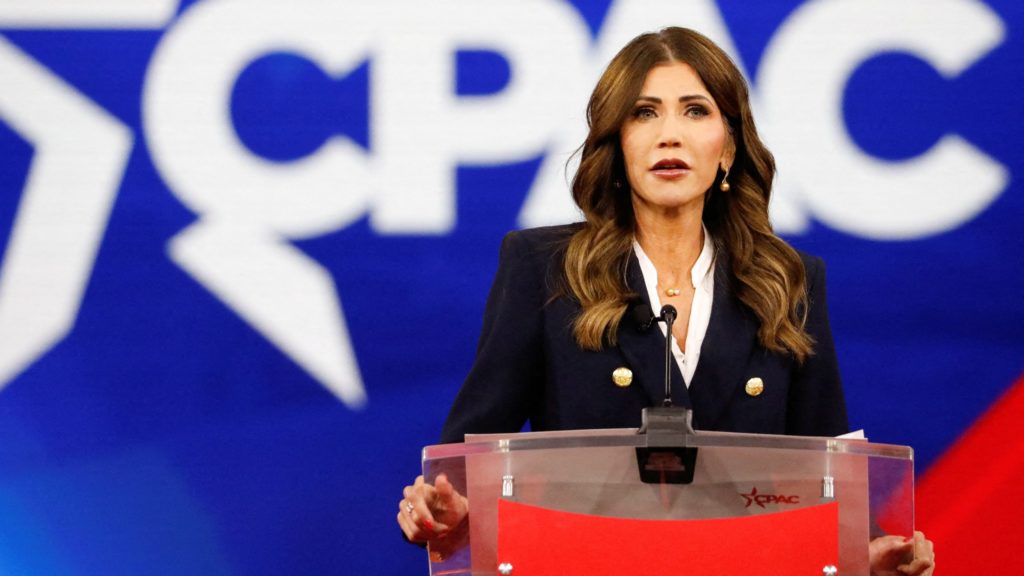South Dakota Gov. Kristi Noem signed legislation Feb. 13 banning certain types of medical or surgical gender reassignment procedures for minors who identify as transgender.
The bill, HB 1080, scheduled to go into effect July 1, prohibits health care providers in the state from performing certain types of hormonal or surgical gender reassignments on minors. Violators face having their medical license revoked and the potential for civil action.
The bill text states that health care professionals "may not, for the purpose of attempting to alter the appearance of, or to validate a minor's perception of, the minor's sex, if that appearance or perception is inconsistent with the minor's sex, knowingly."
In a statement calling the legislation the "Help Not Harm" bill, the governor's office said the bill prohibits certain medical and surgical interventions for minors.
"South Dakota's kids are our future. With this legislation, we are protecting kids from harmful, permanent medical procedures," Noem said in a statement. "I will always stand up for the next generation of South Dakotans."
Noem's signature on the bill follows comparable legislative actions. Earlier in February, she signed a bill blocking transgender student athletes from competing on sports teams opposite their biological sex. Noem vetoed a similar transgender sports bill in 2021, citing concerns about potential litigation from the National Collegiate Athletic Association if she did so.
Noem, who is Republican, has recently fueled speculation she may enter the 2024 Republican presidential primary, while also striving to remain allied with former President Donald Trump, who is running for a second term. Noem has sharply criticized former U.N. Ambassador and South Carolina Gov. Nikki Haley, who declared her Republican candidacy Feb. 14, as well as Gov. Ron DeSantis, R-Fla., a Catholic who also is seen as a likely contender although has not yet declared his candidacy.
The controversial issue of gender will likely become a frequent topic of the Republican primary as states either move to restrict or protect such interventions. Lawmakers in Minnesota recently proposed legislation that would make the state a "trans refuge" for youth experiencing gender dysphoria.
Joseph Meaney, president of the National Catholic Bioethics Center, praised the new South Dakota law's "emphasis on children."
"If they are given large doses of puberty blockers or cross-sex hormones, that tends to trap people into a gender transition," Meaney told OSV News, explaining children aren't equipped to make such "life changing" decisions that could come at the future cost of their health or their fertility later in life.
Meaney said the church teaches that God created each person, including their sex, and that it cannot be changed, but young people are uniquely vulnerable to attempts otherwise.
"It's particularly important for young people to have a non-interventionist approach," he said.
Matt Sharp, senior counsel for Alliance Defending Freedom and director of its Center for Legislative Advocacy, praised the bill, arguing that "denying the truth that we are either male or female hurts real people, especially vulnerable children."
"By enacting this legislation, South Dakota has taken critical steps to protect children from radical activists that peddle gender ideology and pressure children into life-altering, experimental procedures and drugs," he said.
The Human Rights Campaign, a LGBTQ+ political advocacy group, criticized the bill, calling it discriminatory.
Cathryn Oakley, HRC’s state legislative director and senior counsel, said in a statement that Noem was "wielding the power of the state to discriminate against these kids simply because they're transgender."
"This dangerous and discriminatory policy ignores the facts about gender affirming care and only breathes more oxygen into the misinformation and extremism that far-right politicians like Governor Noem seem all too eager to dabble in for their own purposes and at the expense of these kids,” Oakley said.
But Sharp said "science and common sense tell us that children aren't mature enough to properly evaluate the serious ramifications of making certain decisions; the decision to undergo dangerous and likely sterilizing gender transition procedures is no exception."
"We commend Gov. Noem and the South Dakota Legislature for standing up for the truth by enacting these vital protections for our children,” Sharp said.
Catholic dioceses are starting to grapple with pastoral approaches to gender dysphoria. The Diocese of Sioux Falls, South Dakota, issued in 2022 new guidelines for transgender youth stating that diocesan schools should demonstrate "conformity with the student's biological sex as determined from conception and manifest at birth and at the time of the student's enrollment."
The Diocese of Des Moines, Iowa, issued Jan. 16, 2023 new guidance and policies on ministering to people experiencing gender dysphoria. It called for coherence with the church's teaching on the inseparability of gender from biological sex while emphasizing pastoral compassion for children and adults experiencing an incongruence between their sex and gender.
The South Dakota Catholic Conference did not respond to a request for comment on the new legislation by OSV News' deadline.

